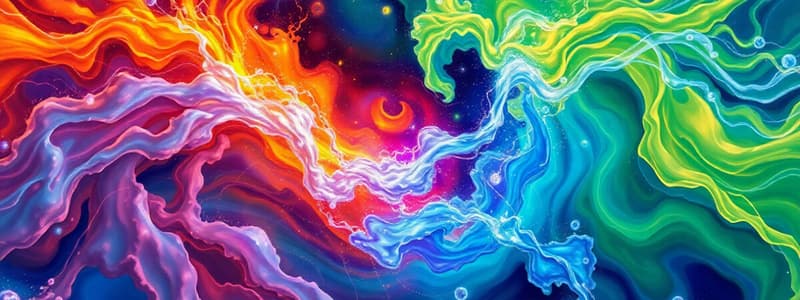Podcast
Questions and Answers
What happens to the chemical composition of a substance during a physical change?
What happens to the chemical composition of a substance during a physical change?
- It changes completely.
- It changes based on temperature.
- It remains unchanged. (correct)
- It partially changes.
Which characteristic best distinguishes a Bose-Einstein condensate from other states of matter?
Which characteristic best distinguishes a Bose-Einstein condensate from other states of matter?
- Particles form ions.
- Particles are tightly packed.
- Particles stop moving at absolute zero. (correct)
- High energy state.
Which of the following best describes the density of gases compared to solids?
Which of the following best describes the density of gases compared to solids?
- Gases have a density equal to solids.
- Gases have higher density than solids.
- Density of gases varies widely with temperature.
- Gases have lower density than solids. (correct)
What type of change is rusting considered to be?
What type of change is rusting considered to be?
What is the primary difference between organic and inorganic matter?
What is the primary difference between organic and inorganic matter?
Which property of matter can be observed without altering its composition?
Which property of matter can be observed without altering its composition?
When a solid changes to a liquid, what is the primary reason for this phase change?
When a solid changes to a liquid, what is the primary reason for this phase change?
What is the arrangement of particles in a gas?
What is the arrangement of particles in a gas?
Flashcards are hidden until you start studying
Study Notes
Matter and Energy
- Matter is responsible for transformations in states, e.g., ice (solid water) becomes liquid water through heat energy.
- Energy plays a crucial role in these transformations.
Matter
- Defined as anything that possesses mass and volume.
- Mass refers to the amount of substance, while volume indicates the space occupied by that substance.
Physical & Chemical Change
- Physical Change:
- Alters appearance or state without changing composition.
- Examples include cutting paper and melting ice.
- Chemical Change:
- Alters both appearance and composition, resulting in new substances.
- Examples include burning paper and rusting metals.
Particle Arrangement
- States of matter differ in shape, volume, heat expansion, and density:
- Solid: Definite shape & volume, slight expansion, high density.
- Liquid: Indefinite shape, definite volume, slight expansion, medium density.
- Gas: Indefinite shape & volume, high expansion, low density.
Phase Change
- Matter can transition between states; this transformation is a physical change, leaving chemical composition intact.
Origin of Matter
- Organic Matter: Derived from living things and contains carbon-hydrogen (C-H) bonds.
- Inorganic Matter: Comprises non-living substances, such as carbon dioxide.
Fundamental States of Matter
- Main states include solid, liquid, and gas, each with distinct particle arrangements:
- Solid: Particles packed tightly, fixed positions, unable to slide past one another.
- Liquid: Particles in close contact yet able to slide freely.
- Gas: Particles widely separated, moving freely and easily compressed.
The Fourth and Fifth State of Matter
- Plasma: Ionized gas with electrically charged particles, similar to gases but with this additional charge.
- Bose-Einstein Condensate: Formed when bosons are cooled to near absolute zero, causing them to condense into the lowest quantum states, halting movement.
Properties of Matter
- Properties refer to characteristics that can be observed or measured, such as density, color, mass, and volume.
- Physical Properties: Observable without altering composition (e.g., color, density).
- Chemical Properties: Observable changes occur upon interaction, indicating a change in composition.
Studying That Suits You
Use AI to generate personalized quizzes and flashcards to suit your learning preferences.




